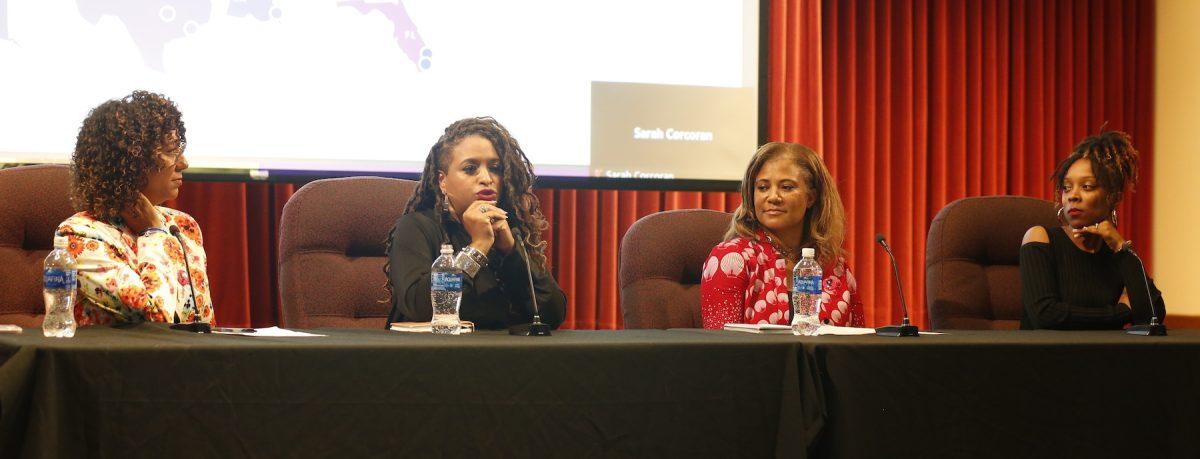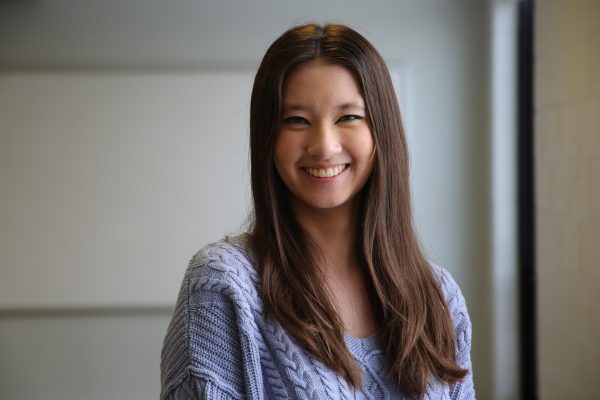A panel on the CROWN Act, which guarantees protection against hair-related prejudice, specifically discrimination against Black hairstyles, was held Oct. 5 on the Hawk Hill campus.
The CROWN Act, which stands for Creating a Respectful and Open World for Natural Hair, protects U.S. citizens from being discriminated against for wearing hairstyles that include locs, twists, braids, Afro’s and Bantu knots. Currently, 23 states have adopted the CROWN Act law. On a federal level, the CROWN Act passed in the U.S. House of Representatives in 2022 but failed to pass in the U.S. Senate.
Held in the Mandeville Hall Teletorium, the panel featured D. Wendy Greene, J.D., LLM, professor of law and director of Drexel University’s Center for Law, Policy and Social Action; Kimya S.P. Johnson, J.D., chief diversity, equity and inclusion officer and principal at Jackson Lewis P.C.; and Jennifer Benn, licensed cosmetologist and owner of the Wynnewood-based salon, With Every Strand.
It was moderated by Carrie Nelson-Robinson, associate vice president of Human Resources and chief diversity and inclusion officer at Peirce College.
Greene said the CROWN Act differs from past forms of legislation because it’s the first document in civil rights history to define the civil rights included in the act.
“Depending on the particular jurisdiction, you can extend beyond discrimination on the basis of hairstyles to think more broadly in terms of characteristics commonly associated with our racial and ethnic identities like our hairstyles [and] hair colors, like our dress, our accents, our language and so forth,” Greene told the audience.
The panelists also discussed their personal experiences with hair-related discrimination. Benn said during her eight years in information technology and healthcare, she was treated differently by her peers when she wore a straight, blonde hairstyle instead of a natural style like a two-strand twist.
“As a Black woman, it’s a lot to process because you want to be seen as yourself but at the same time, you want to just be accepted in the corporate society,” Benn said.
Because hair is heavily associated with identity, wearing natural hair is not only emotional but a form of self-expression representing an individual’s identity, Benn said.
“People [wearing natural hairstyles] are trying to make a statement,” Benn said. “To say, ‘this is who I am, and I’m tired of pretending to be someone else.’ So I just think that the benefit of whether you choose to lock your hair, twist your hair or wear your Afro – the benefit is being able to tell people, ‘this is who I am. And this is what you’re going to be comfortable with.”
The CROWN Act also concerns bodily rights. Johnson said Black and brown bodies have been historically regulated throughout the U.S. and world. Specifically, Johnson recalled when 16-year-old Andrew Johnson, a South Jersey wrestler, was forced to cut his dreadlocks before a 2018 match.
“We saw his locks being cut by a third party without his parents’ permission, without his permission, and many of us felt that trauma,” said Johnson, who is not related to the wrestler. “We saw it, it went viral and we felt it. We felt it as a basic human infringement if not outright assault.”
Johnson said she views the event as a way to educate others about violations similar to Andrew Johnson’s.
“I saw that as an opportunity in many ways to help folks understand that this type of assault may not be something that you see everyday, but many of us feel this pain,” Johnson said.
Robinson told the Hawk before the panel Black people should feel safe in all spaces, from home to school to the workplace.
“Your hair, as well as anything else identifiable about you, should never be put into question or should be a reason that you do not feel that your environment is a safe and welcoming environment,” Robinson said.















































